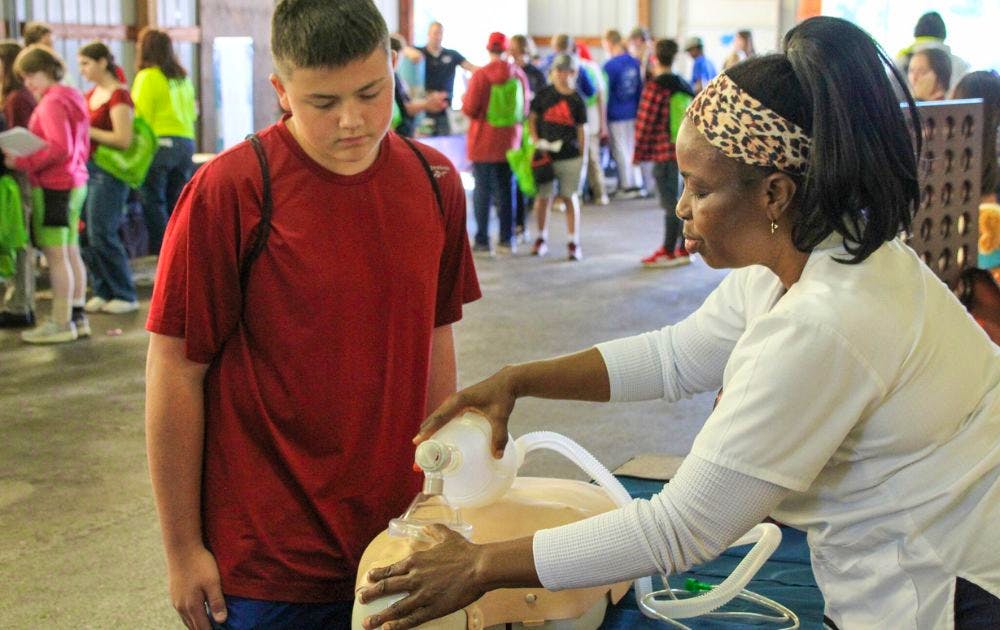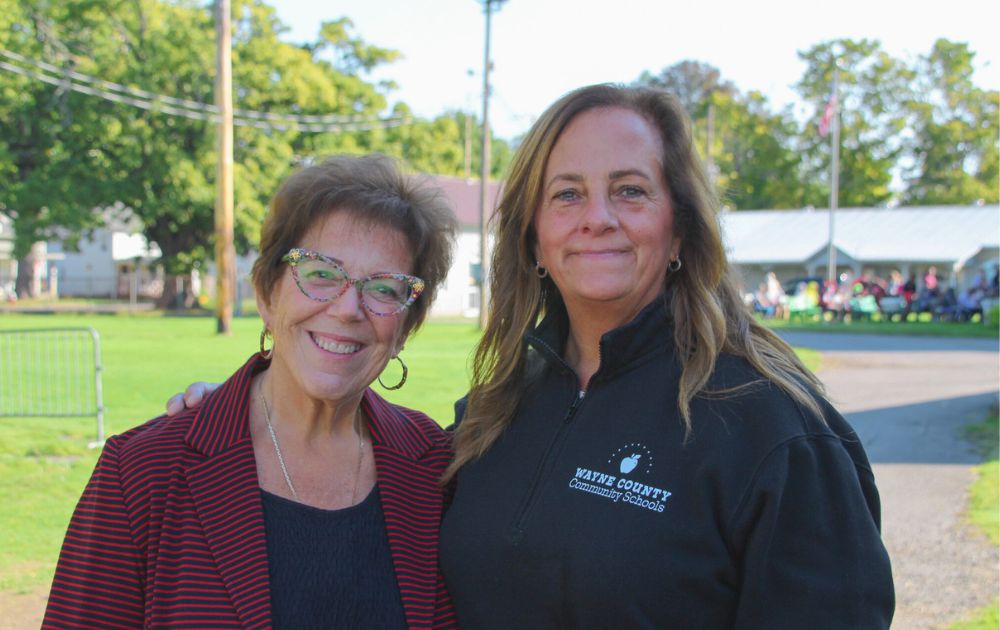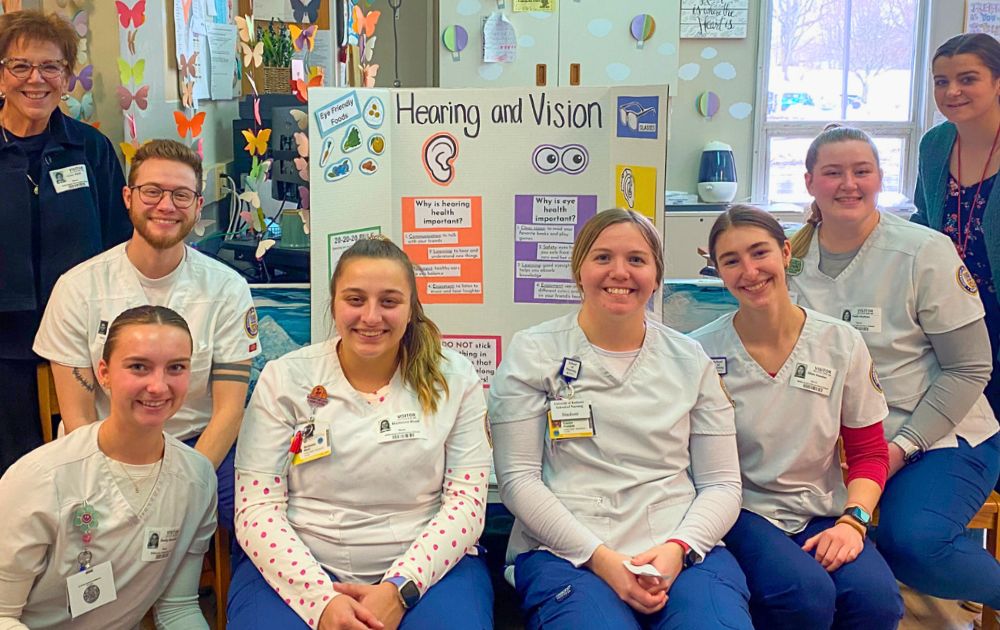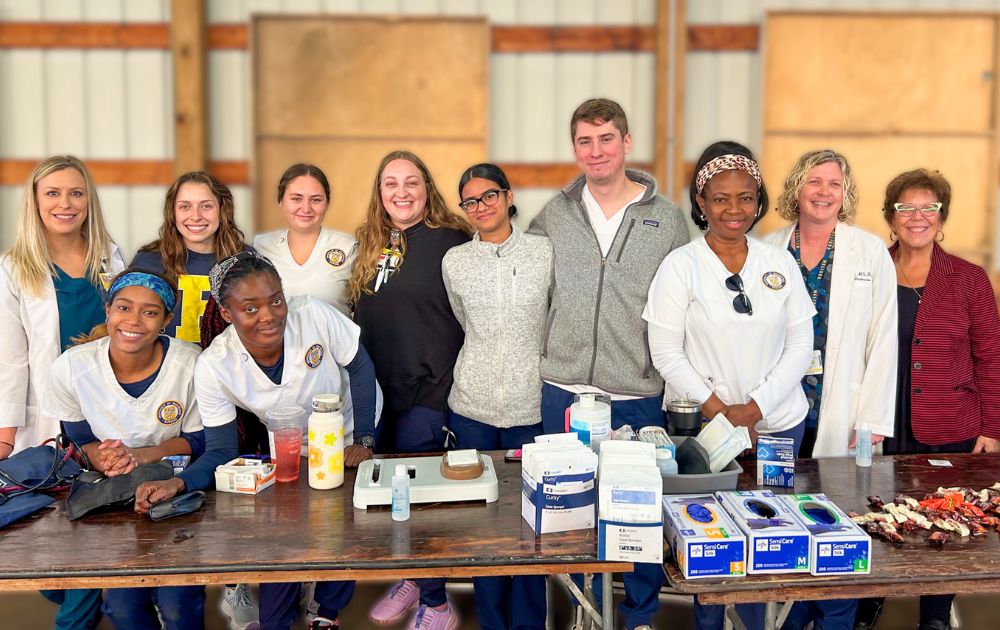Caring for Classrooms: UR Nursing Students Team with Community Schools to Boost Rural Health
By Gianluca D'Elia
Wednesday, August 13, 2025

There’s much more to a school nurse’s daily work than bandages and ice packs. The age-old stereotype about school nursing is especially far from the truth in rural areas, where access to care is often limited and nurses are at the front line of supporting hundreds of students’ well-being.
Piloted over the past year, a blossoming partnership between the University of Rochester School of Nursing and Wayne County Community Schools (WCCS) is offering aspiring nurses an inside look at the role of nurses in schools and communities while improving health literacy among K-12 students.
Since last fall, accelerated bachelor’s (ABSN) students have hosted health fairs at schools and summer programs across Wayne County, led educational sessions on topics like personal hygiene and puberty, and assisted nurses in conducting state-mandated health, vision, and hearing screenings.
“School nurses work autonomously, caring for 300-400 kids and addressing physical, social and mental health needs. They are the ones who take care of the child with cancer, or the child with juvenile diabetes,” said Assistant Professor of Clinical Nursing Leann Patel, MSN, RN, who coordinates community health clinical experiences for ABSN students. “These nurses do good, hard, and necessary work. It’s powerful for nursing students to have this exposure to the roles of school and community health nurses.”
Nationally, rural school districts face significant disparities in school health services, with just over half of rural public schools employing full-time nurses, according to the National Association of School Nurses.

For ABSN students, who spend most of their program training in hospital settings, the experience is both an opportunity to explore a different path in the nursing profession and a reminder of school nurses’ significant role.
“The school nurse’s office is often the first place a child will go because they feel safe there. It could be that food insecurity or housing stability is an issue for their family, or they’re having a mental health issue,” said WCCS Optimal Health Director Jill Harper, RN, who has more than 20 years of experience as a school nurse. “We have to have knowledge in mental health, physical health, and assessment skills, and to be able to build long-standing relationships.”
“Working with the School of Nursing has been a mutually beneficial experience,” she added. “Not only are students helping nurses with days’ worth of work, but it’s also an opportunity to talk about why we as school nurses really love what we do — the ability to educate and work with our students, and to build relationships with families.”
Looking ahead, faculty are currently planning to incorporate the School of Nursing’s RN-to-BS and master’s programs into the partnership, and to serve additional school districts.
“The sustainability of these relationships is testimony to great work our students are doing out in the community,” Patel said.

ABSN student ambassador Anna LaPoint '25N looks forward to applying what she learned from her clinical experience with WCCS when she begins her career with UR Medicine in the fall.
“In Rochester, we get used to being at a large school with access to a lot of resources, technology, and people to support us,” LaPoint said. “The social determinants of health that communities and families face on a day-to-day basis can be very different from what we experience here.”
Over the Summer 2025 semester, LaPoint was one of 10 students in her cohort to visit the Norman R. Kelley School, an elementary school in Newark about 50 minutes away from UR Nursing. She and her classmates prepared lessons for more than 70 summer program students on topics such as sun safety, wearing helmets, oral hygiene, self-esteem, and screen time and visual safety.
“Throughout the course, we came to realize that it’s important for nurses to know how to educate, to help prevent future diseases and complications, and to provide holistic care in the community,” LaPoint said.
LaPoint had spent several years working with kids as a swim coach, nanny, and babysitter, but found herself learning new lessons during her time in Newark.

“Something I learned from this experience is that everyone has a different background and different story, and that influences how kids learn,” she said. “The range of questions students asked us showcased the different levels of health literacy that exist in the community. Going into my future practice with unbiased, cultural humility is going to be essential.”
Fellow ABSN student Julia Boran '25N shared a similar sentiment, having gained a better understanding of nurses' impacts and responsibilities in schools and community health settings. As part of her clinical experience, she worked with a partner to develop presentations targeting various age groups ranging from 7 to 12 at a school summer program.
"As nursing students, we were able to supply current, up-to-date information and answer pertinent questions in a client-friendly manner," Boran said. "This helped me gain insight on meeting students where they are at and providing education in a manner that they can understand and relate to."
Being able to provide tailored patient education is an essential skill Boran plans to take with her going forward, and one that proved to be useful during her time in Newark.
"My group noted that individuals in this area encountered higher incidences of population and exposure to harmful chemicals related to farming. Based on this, we discussed sun exposure education and included education regarding harm reduction, exercise, and lifestyle planning," she recalled.
Meeting nursing students like LaPoint and Boran has also enhanced career awareness. About 25% of Wayne County residents have a bachelor’s degree education, according to NIH data, and many pursue technical careers in farming communities.
The partnership’s creators hope that ABSN students’ presence will empower WCCS students to think about their own futures.
“A lot of our children don’t know something else exists yet,” Harper said. “When our students see nursing students in their scrubs, have a chance to ask them questions, or even meet men who are nurses, it’s an eye-opening experience, especially for our older students to think, ‘This is something I could see myself doing.’”
Categories: Community, Accelerated Programs, Clinical Experience

